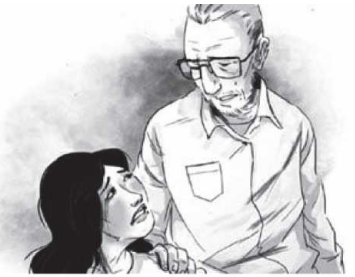'Nina, you can't cross the bridge,' my father said.
“尼娜,你不能過(guò)橋。”我爸爸說(shuō),
'It's dangerous for you over there. There are men with guns everywhere, and they watch the bridge night and day.
“那邊對(duì)你來(lái)說(shuō)太危險(xiǎn)了。那里到處都是拿著槍的人,他們?nèi)找贡O(jiān)視著那座橋。
And Dragan can't come here - not now. We must all wait. Perhaps one day you can see him again.'
而且,德拉甘也不能過(guò)來(lái)一一現(xiàn)在不行。我們都得等。或許有一天你能再見(jiàn)到他。”
'Wait?' said Nina, and the tears came to her eyes again. 'For how long?'
“等?”尼娜說(shuō),她的眼淚又再次涌出來(lái)。“要等多久呢?”
A week later, Nina left our house very early one morning. Nobody heard her.
一個(gè)星期之后的一個(gè)早上,尼娜一大清早離開了家。沒(méi)有人聽到她出門,
Dragan left his house, too, and they both walked carefully and quietly to the bridge.
德拉甘也離開了他家。他們小心謹(jǐn)慎地、悄悄地往橋那邊走去。
They just wanted to see each other. Nina left a message for us in her room.
他們只是想見(jiàn)見(jiàn)對(duì)方。尼娜在她的房間里給我們留了字條。
'I'm not going onto the bridge,' the message said, 'but I must see him. I can't wait any longer.'
“我不會(huì)走上橋的,”字條上寫道,“但我一定要見(jiàn)到他。我不能再等了。”

We waited all day. Where was she? My mother phoned all our friends, but nobody had any news.
我們等了一整天。她去哪兒了?我媽媽給所有的朋友打了電話,但沒(méi)有人知道她的下落。
Then that evening an old friend of the family came to the door.
然后傍晚時(shí),我家的一位老朋友找上門來(lái)。
'I have some terrible news,' he said. 'I'm so sorry, so sorry.'
“我有個(gè)令人難過(guò)的消息。”他說(shuō),“我感到非常,非常惋惜。”
At once my mother began to cry. My father put his arm around her. 'Tell us,' he said.
我媽媽一下子就哭了出來(lái)。我爸爸摟住她。“告訴我們吧。”他說(shuō),
'It's about my daughter, yes? My little Nina...'
“是關(guān)于我們女兒的,對(duì)吧?我的小尼娜......”
'It happened this morning,' our friend said. 'On the bridge. Your daughter saw her boyfriend Dragan on the other side.
“這是今天早上發(fā)生的事情。”我們的朋友說(shuō),“在橋上發(fā)生的。你們女兒看見(jiàn)她的男朋友德拉甘在橋的另一頭。
She called his name, and he ran onto the bridge - and somebody shot him.
她喊他的名字,他就跑上 了橋——然后有人向他開槍。
When he fell, she ran onto the bridge at once. She took him in her arms, but somebody shot her too.
他倒下了,尼娜就立刻跑上了橋。她把他抱在懷里,但同樣被槍擊。











